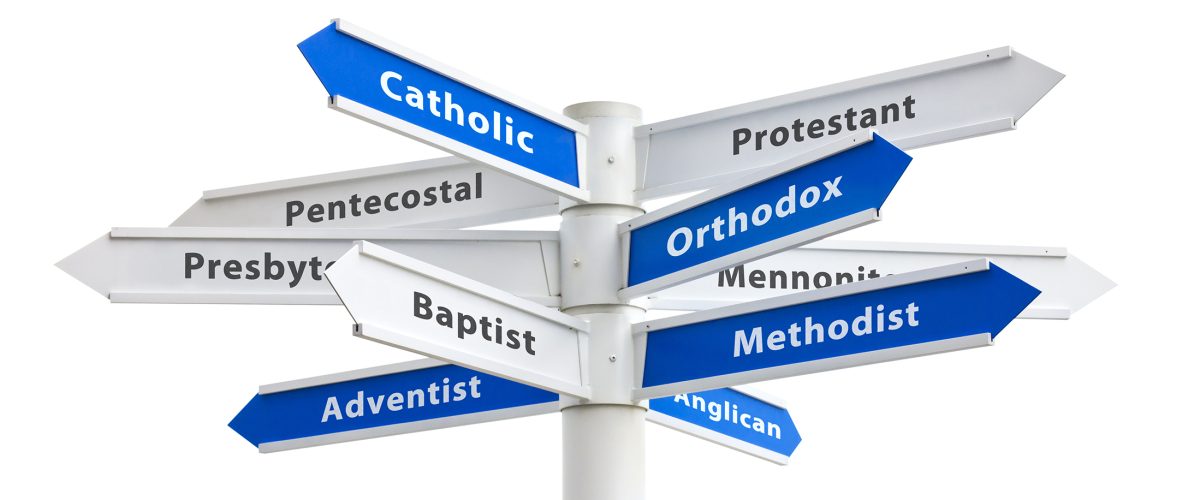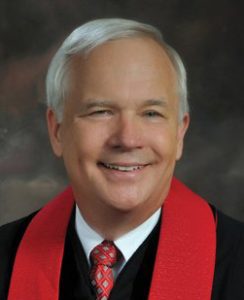American religious historian Nathan Hatch famously argued that when you scratch beneath the surface of piety and polity that distinguishes them, Baptists and Methodists are actually more alike than they appear because the same cultural forces of democratic populism shaped both movements.
Even still, encounters between 19th-century Methodist circuit riders and Baptist farmer preachers often were contentious.
Methodist itinerant John Early criticized the Baptist fixation on believer baptism by immersion, complaining, “They are always ready to steal our lambs or turn our chickens into ducks by putting them into water.” Comparing the Baptist religion to an old horseshoe, Early continued, “Heat it and push it into the water and it will hiss for a while but soon get cold again.”
Baptists countered by singing a verse from a Baptist version of Hymns and Spiritual Songs:
If you would follow Jesus,
As Christians ought to do,
You’d come and be immersed,
And be a Baptist too.
Yet those heated disputes arose out of the shared evangelical struggle for souls that transformed our upstart sects into thriving denominations.
Differences in polity
Our differences stem from our polity. Baptists are congregational, and Methodists are connectional. So it came as some surprise when the United Methodist Church began to exhibit signs of disharmony that now have led about a quarter of the churches in the denomination to disaffiliate from the UMC. The response of my colleague, retired Methodist Bishop William H. Willimon, was to write a book, Don’t Look Back, on their current denominational crisis.
Willimon expresses hope that Methodist churches will rediscover the innovative spirit that led to expansive growth transforming their movement into the largest religious body in the United States by the turn of the 20th century. It is too early to tell how this change will affect the UMC, but thus far, the results are mixed.
He told me of one minister who led his church to disaffiliate. Their very first action as an independent congregation was to dismiss the pastor who never saw it coming.
“Methodist ministers don’t have the political savvy to negotiate congregational polity the way you Baptists have learned to,” he told me. He was right. Congregationalism, like connectionalism, is hard work. It’s not just about taking votes. It’s a practice of communal discernment.
Consideration of the future of the UMC is one thing, but when his home church, the Buncombe Street Methodist Church in Greenville, S.C., voted to disaffiliate, it caught Willimon off guard. He wondered how the people who nurtured him into faith could leave their connectional church to become free-agent congregationalists.
In an attempt to work out his confusion and disappointment, Willimon has written an enlightening account under the title Losing a Church, due in June 2025. It is a love story gone tragically wrong. As he puts it, “The church I remembered had been dismembered.”
A Southern Baptist in disguise?
The source of dismemberment, as Willimon tells it, was the new minister. The bishop appointed him to the church as a licensed local pastor, not an ordained elder, because he refused to itinerate. That is, he would not agree to serve where the bishop sent him. It was an unusual process, out of step with the tradition at Buncombe Street and Methodist practice. Yet what the new pastor lacked in denominational credentials he more than compensated in political shrewdness. It did not take long for him to lead the church to disaffiliate.
Willimon asked me to listen to some of the pastor’s sermons. A few days later he questioned me, “Don’t you think he’s a closet Southern Baptist?”
To be fair, the new pastor had grown up under the preaching of a Baptist who had a long run as a lay preacher at a small Methodist church in South Carolina. I told him, “It’s worse than that.”
“What do you mean?” he said, “How could it possibly be worse?”
“The Southern Baptists have gone Presbyterian!”
I replied, “The Southern Baptists have gone Presbyterian!”
That pretty well ended the conversation.
When I told that story to a friend, he said, “You slandered Presbyterians.”
I explained what I had in mind was not the sedate form of Presbyterianism you find today in communities throughout the United States. I was thinking about more militant Puritan expressions, like 17th-century Presbyterian heresiographier Thomas Edwards, whose massive tome Gangraena portrayed Baptists as dangerous and disorderly. Edwards railed against Baptists who allowed “she preachers” to “keep constant lectures, preaching weekly to many men and women.”
That sort of Presbyterianism considers Baptist religion an infectious agent of putrefaction in the body of Christ.
I have to admit, Willimon was right. That young minister in his home church really was just a Baptist preacher thinly disguised in a Methodist frock. John Wesley was big on sanctification and social holiness. The young man at Buncombe Street Church sounded more like the kind of Baptists who seem to think the only thing that matters is “getting saved.”
As a Baptist preacher once put it, “You get right with the Lord, and you can live just like you want to the rest of the time.” It is a convenient theology, to be sure: “Free from the law, oh happy condition, sin all I want, and still get remission.”
Whatever that is, it isn’t Methodism.
Wildcat religion
The invasive strains of spirituality that threaten Baptists and Methodists these days are more akin to what Mark Twain called “wildcat religion.” Methodists are fending off closet Baptists trying to subvert their connectional church, while Baptists are struggling to stamp out strict Presbyterianism seeking to make their faith and practice more orderly.
“I was more than a little distressed to discover the pastor of my home church was the one who introduced the motion.”
At the top of the agenda these days among Baptist Puritans, like it was for old Thomas Edwards, seems to be removing the contagion of “woman pastors” from the SBC, and the instrument to do it is the Baptist Faith and Message 2000, which limits the office of pastor to men. The message is plain and clear, “Either get rid of them or we’ll get rid of you.”
When the SBC solidified the fundamentalist takeover, the Baptist General Convention of Texas refused to adopt the Baptist Faith and Message 2000 as its articles of faith. At this year’s annual meeting, messengers considered a motion by the pastor of First Baptist Church in Denton to affirm the Baptist Faith and Message 2000. They vigorously debated and soundly defeated the proposed motion.
I was more than a little distressed to discover the pastor of my home church was the one who introduced the motion. I was even more shocked to learn that earlier this fall, with very little deliberation or discussion, he succeeded in getting his congregation to adopt the Baptist Faith and Message 2000 so they could receive financial support for mission work from the SBC North American Mission Board.
Few congregants likely knew the political significance of their action, but it did not escape my notice. I knew the church I once loved was lost.
The pastor who baptized and ordained me, L.L. Armstrong, was a great soul with no hankering for titles. Everyone just called him “Preacher.” He was beloved by all. A calm conservative, not a fussy fundamentalist. He preached the evangelical gospel of “whosoever will may come.” He considered the ministers, staff and deacons of the church partners in a shared ministry. He affirmed and trusted the work of church committees. And he was a stickler for process at the church meeting which carefully followed Roberts Rules of Order.
For the past 27 years, FBC Denton has been led by a very different sort of pastor. Church members describe him as defensive, suspicious and controlling. Former staff characterize his leadership style as contributing to “a hostile work environment” and report experiencing “abusive or toxic behavior” from him. It is not surprising that in June 2024 the church personnel committee voted 6 to 3 to recommend his termination.
“The new system of governance is Baptiterian.”
The pastor and deacons rejected the recommendation and disbanded the Personnel Committee. The congregation is presently moving toward a new governance model, an all-male board of elders that alongside the pastor will rule the church. Goodbye, congregational polity. The new system of governance is Baptiterian — a hybrid version of Presbyterianism that has elders with no presbytery to hold them accountable.
As an old school Baptist, I believe in the promise that where two or three are gathered Christ is present, and where Christ is, there is the church (Matthew 18:20). I do not need a bishop or an elder board telling me what to do. Yet I can also respect my Methodist sisters and brothers, who object to the baptistification of Methodism.
Closet Baptists have no business meddling with Methodist religion, and pseudo-Presbyterians need to stop trying to domesticate Baptists by ensuring that “all things be done decently and in order” (1 Corinthians 14:40).
Maybe the most important lesson we can learn from these sad stories is that being church is difficult. It’s not easy, but Methodist connectionalism and Baptist congregationalism are time honored and proven ways of being faithful to the gospel in the messiness of life together. It is a mistake to think we can reinvent our way of being church by pretending to be something we’re not.
We cannot afford to indulge in these disastrous experiments. In the inimitable words of Mark Twain, “Let us all be content with the tried and safe old regular religions and take no chances on wildcat.” Sound advice.
Curtis W. Freeman serves as research professor of theology and Baptist studies and the Ruth D. Duncan director of the Baptist House of Studies at Duke Divinity School. He was co-chair of the Baptist-Methodist International Bilateral Dialogue (2013-18). Among his publications is Undomesticated Dissent: Democracy and the Public Virtue of Religious Nonconformity.
Related articles:
Only 34% of evangelicals are loyal to a single denomination
Why is there a growing trend toward elder governance in Southern Baptist churches? | Analysis by Rodney Kennedy




